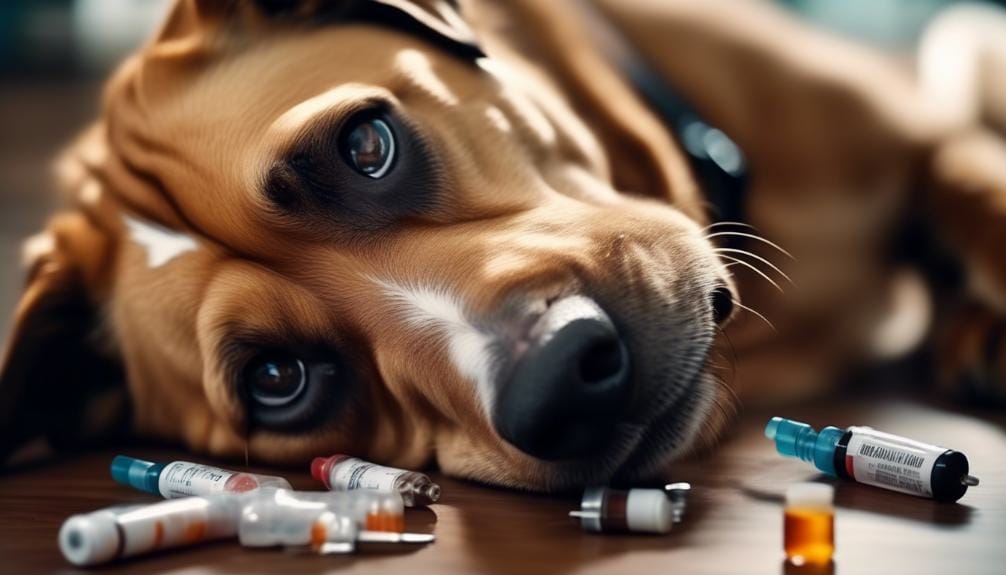Hey there, pet parent! If you’ve ever wondered how long your diabetic dog can manage without their insulin, there’s a lot to consider.
Understanding the ins and outs of diabetes in dogs and the crucial role insulin plays is essential for their well-being. The importance of insulin for diabetic dogs goes beyond just managing blood sugar levels—it’s a lifeline.
But what happens if a dose is missed? Or worse, if there’s an accidental overdose? Understanding the risks and knowing how to manage your furry friend’s insulin dosage is key to their health.
So, let’s dive into the important facts that every pet parent should know to keep their diabetic dog thriving.
Key Takeaways
- Diabetic dogs require insulin injections and regular veterinary check-ups to manage their condition effectively.
- Skipping insulin doses can lead to worsening symptoms and health complications in diabetic dogs.
- Consistent insulin treatment is necessary for a diabetic dog’s well-being and to prevent impaired eyesight, blindness, and reduced life expectancy.
- Insulin overdose can cause low blood sugar levels (hypoglycemia) in dogs, which can be fatal and requires immediate veterinary treatment.
Understanding Diabetes in Dogs
Understanding diabetes in dogs is crucial for providing proper care and ensuring your furry companion’s well-being. Diabetes in dogs can be classified into two types: type 1, where the body doesn’t produce enough insulin, and type 2, where the body becomes insulin-resistant. Insulin plays a vital role in managing a diabetic dog’s condition by regulating the glucose levels in their blood.
Administering insulin through injections is essential, typically done twice a day, as prescribed by the veterinarian. Monitoring your dog’s food intake and ensuring they’ve a consistent meal schedule also helps manage their glucose levels. Regular veterinary check-ups are crucial for assessing the dog’s condition, adjusting insulin dosage if necessary, and preventing long-term health issues.
It’s important to note that missing an insulin shot may not have immediate consequences, but it can significantly affect your dog’s quality of life and life expectancy over time. Moreover, giving too much insulin can lead to low blood sugar levels, causing hypoglycemia, a potentially fatal condition that requires immediate veterinary intervention. Therefore, understanding diabetes in dogs and adhering to the prescribed treatment plan is essential for your diabetic dog’s well-being.
Importance of Insulin for Diabetic Dogs

If your diabetic dog’s well-being and long-term health are of utmost importance to you, then recognizing the critical role of insulin in managing their condition is essential.
Insulin is of utmost importance for diabetic dogs as it plays a crucial role in regulating blood glucose levels. Dogs with diabetes mellitus require insulin injections to maintain their health.
While adjusting the dog’s feeding routine can help manage the condition, insulin remains the primary medication for treatment. It’s important to understand that skipping insulin can have severe consequences for your diabetic dog.
Consistently administering insulin injections is crucial, as missing a dose can lead to worsening symptoms, decreased life quality, and potential health complications such as diabetic ketoacidosis and impaired eyesight.
To ensure your dog’s well-being, it’s essential that they receive proper and consistent insulin treatment. Regular glucose level tests are necessary to determine the appropriate insulin dosage and to maintain your diabetic dog’s health.
Risks of Missed Insulin Doses

Skipping insulin doses for your diabetic dog can have serious health consequences and should be actively avoided to maintain their well-being and quality of life. Missing insulin doses for your diabetic dog can lead to a range of risks and complications that can worsen their condition over time.
Here are some important points to consider:
- Long-term Consequences: Skipping insulin can lead to a decrease in your dog’s life quality and expectancy, resulting in weight loss, excessive urination, and diabetic ketoacidosis.
- Vision Impairment: Not giving your dog insulin is similar to not treating diabetes at all, and it may result in impaired eyesight, cataracts, and even blindness.
- Life Expectancy: Without insulin, a diabetic dog’s life expectancy can be significantly reduced, ranging from two months to two years.
- Hypoglycemia: Giving too much insulin can cause low blood sugar levels and hypoglycemia, a potentially fatal condition that requires immediate veterinary treatment.
It’s crucial to adhere to the prescribed insulin regimen, monitor your dog’s blood sugar levels, and consult with your veterinarian regularly to ensure your diabetic dog receives the necessary treatment and care. Any concerns about missed doses or insulin injections should be promptly discussed with your veterinarian to avoid any potential risks.
Effects of Insulin Overdose in Dogs

Ensuring the proper administration of insulin for your diabetic dog is crucial, as it not only helps manage their condition but also prevents potential risks such as insulin overdose, which can lead to serious health complications.
Overdosing insulin can cause low blood sugar (hypoglycemia) in dogs. This condition can be fatal and requires immediate veterinary treatment. If your dog experiences an insulin overdose, they may exhibit symptoms such as weakness, confusion, seizures, and loss of consciousness.
It’s crucial to seek veterinary assistance promptly if you suspect an insulin overdose in your diabetic dog. Remember, preventing insulin overdose involves careful monitoring, proper dosing, and following veterinary instructions closely. Always consult a veterinarian for guidance on managing insulin overdose in dogs.
Management of Diabetic Dog’s Insulin Dosage

To effectively manage your diabetic dog’s insulin dosage, regular glucose level tests are crucial to determine the appropriate amount of insulin needed for their condition. Here are four essential steps for regulating and monitoring your diabetic dog’s insulin dosage:
- Consult with your veterinarian to establish a tailored insulin treatment plan based on your dog’s specific needs. This plan may include the type of insulin, dosage amount, and injection schedule.
- Administer insulin injections at the same time each day to maintain consistency and help regulate your dog’s blood sugar levels effectively.
- Monitor your diabetic dog’s behavior and physical symptoms regularly. Look out for signs of low or high blood sugar, such as weakness, confusion, excessive thirst, or frequent urination.
- Keep a detailed record of your dog’s insulin dosage, feeding schedule, and any observed changes in their condition. This information will assist your veterinarian in making necessary adjustments to the insulin dosage as needed.
Frequently Asked Questions
What Happens if You Don’t Give Insulin to a Diabetic Dog?
If you don’t give insulin to a diabetic dog, their blood sugar levels can spike, leading to diabetic ketoacidosis, impaired eyesight, and decreased life quality. Contact your vet for advice if you miss a dosage.
What if Diabetes Is Left Untreated in a Dog?
If diabetes is left untreated in a dog, it can lead to serious complications like diabetic ketoacidosis, decreased life quality, and expectancy. Signs to watch for include weight loss, excessive thirst, urination, and increased appetite.
What Happens if You Don’t Remember if You Give Your Dog Insulin?
If you don’t remember if you gave your dog insulin, contact your vet for advice. Following their instructions for the next injection is crucial. Skipping insulin can decrease your dog’s life quality and expectancy.
What Happens When a Diabetic Goes Too Long Without Insulin?
If a diabetic dog goes too long without insulin, their condition can worsen, leading to weight loss, excessive thirst, and appetite changes. Without insulin, their life expectancy decreases significantly, emphasizing the critical need for regular insulin administration.
Conclusion
In conclusion, it’s crucial for diabetic dogs to receive their insulin doses regularly to maintain stable blood sugar levels and prevent complications.
Missing insulin doses can lead to serious health risks for your furry friend, while overdosing can also have negative effects.
Proper management of your diabetic dog’s insulin dosage is key to keeping them healthy and happy, so be sure to work closely with your veterinarian to ensure they’re getting the right amount of insulin at the right times.





Leave a Reply
You must be logged in to post a comment.